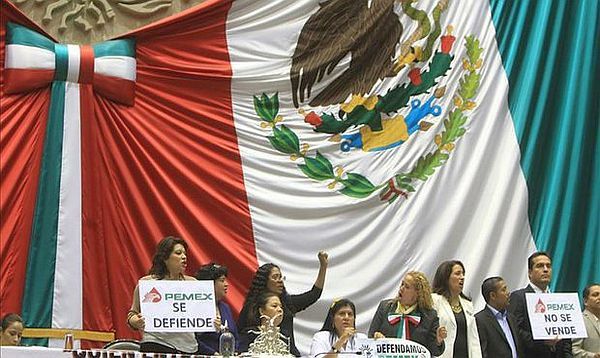Mexico City, Mexico — In a steam-roller operation that ended Monday, a majority of Mexico's state legislatures approved sweeping energy legislation that will allow private companies to explore for and produce oil and gas in the country.
It took only about three days for 17 of the 31 state legislatures, one more than needed, to approve the transformation of Mexico's state-controlled oil industry that Congress passed last week. Some of the state congresses voted through the laws in the early morning hours after little or no debate.
President Enrique Pena Nieto's Institutional Revolutionary Party, the PRI, relied on its dominance of most legislatures to push the bill through despite protests staged by opponents of the changes.
The PRI ruled Mexico from 1929 to 2000 relying on rubber-stamp congresses, and though Mexico has become much more of a democracy since then, many saw similarities to the party's old ways.
"It seems that the country hasn't changed at all — the old ways, the old style of the PRI at its most authoritarian have come to the fore," said Carlos Navarrete, a leading member of the leftist Democratic Revolution Party, the PRD, which fiercely opposed the reform.
 |
| A man is aided after protesters try to break into the state congress in Guadalajara, Jalisco last Saturday, December 14. Students, opposition party members, and activists tried to block state congressmen from entering the building to debate the energy reforms that have been already approved on a federal level and now are being debated at the state level. |
"In a process that did no honor to any of the parties involved, the local legislatures had to hold sessions within 72 hours, riding roughshod over rules and procedures, and only in some states did they hold a discussion before voting," Navarrete added.
Pena Nieto, who is on an official visit to Turkey, told the Mexican press that the quick approvals "demonstrate the wide consensus that exists in the country." He said the approvals "have been very rapid but are part of a debate that has been going on for several months, since the proposal was submitted and several debate forums have been held."
Still, the public only learned about a week ago the terms of the overhaul in which it was finally approved. It will allow private contracts for profit- and production-sharing as well as licenses under which companies will pay royalties and taxes to the Mexican government for the right to explore and drill for oil.
The left led opposition, arguing that the overhaul rolls back the landmark 1938 nationalization of Mexico's oil industry and effectively privatizes the energy industry. But leftists were badly outnumbered in Congress, where PRD legislators resorted to seizing the speakers' podium in Congress in a failed attempt to block debate.
Some analysts said the left hurt itself by walking out of inter-party negotiations on the reform weeks ago, and then seizing the podium — giving the PRI a pretext for fast-tracking the energy legislation.
"If the PRD had stayed in the talks, National Action would have been sidelined and the reform would have been much less daring than it wound up," said Ruben Aguilar, the former spokesman for ex-President Vicente Fox of the conservative National Action Party, which supported the reform.
National Action pushed for similar changes while it held the presidency in 2000-2012, but the party didn't have enough votes on its own and the PRI gave it little support.
Original Story


